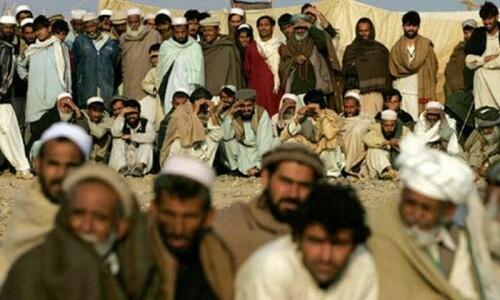ISLAMABAD: The Oil and Gas Regulatory Authority (Ogra) remains divided over the quantum of regasified liquefied natural gas (RLNG) losses to be charged by the gas companies to consumers.
As a result, the regulator has not been able to notify RLNG prices for August, which are normally issued in the first week of each month.
At the heart of the problem is an anomaly in the LNG pricing mechanism under which one set of officials in Ogra advocate for allowing the cost benefit of about 11 per cent RLNG loss to Sui Northern Gas Pipelines Ltd (SNGPL) and 8.73pc to Sui Southern Gas Company Ltd (SSGCL).
The second group questions this methodology on the grounds that RLNG supplies are primarily on main lines where actual losses are negligible. Also, they say that since these proposed losses for RLNG are way higher than those for local gas allowed in gas tariff even on distribution lines where actual losses are significantly higher than transmission or main lines.
Therefore, their argument is that SNGPL and SSGCL do not deserve more than 3pc and 8.85pc unaccounted for gas (UFG) allowance respectively, even on provisional basis and could not be justified.
Due to delay in the RLNG notification, the gas companies would again be at an advantage as they would continue to charge their consumers at higher UFG percentages previously allowed by Ogra.
Interestingly, both RLNG and local gas are supplied mostly through the same network and metered through the same system but the latter is charged with lower UFG than the former despite the fact that RLNG is generally expensive and has lower actual loss.
It is also on Ogra record that total LNG sales and losses combined should not be more than the LNG received in the system and hence UFG allowance claimed for LNG sales should be the basis for RLNG price notifications.
However, actual LNG sales and UFG charged to consumers put the total LNG quantities about 7-8pc higher.
In a statement, Ogra has announced that it had decided in principle to carry out independent verification of UFG loss through audit to conclude whether or not its previous decisions had caused loss to consumers of LNG.
“Ogra may also carry out independent verification through UFG audits as has been done in the past,” said the regulator in a statement issue here on Wendesday, adding that “retrospective adjustments in the light of audit findings are part of determination process”. But this is a time-consuming process and could only trigger when Ogra’s quorum is complete.
The regulator had made this announcement after recently noting through internal workings that it had erroneously been allowing gas companies to charge about 6-7pc higher system to the consumers of RLNG for at least five years, resulting in significantly higher rates.
The record suggested that an Economic Coordination Committee decision of June 2016 provided for “distribution loss to be determined and charged at actual.
The said loss for the customers located on high pressure transmission lines as well as those customers who are willing to lay their dedicated line shall also be determined and charged as actual.
However, for other customers on distribution lines, an actual average UFG for the last financial year will be taken in the determination.” The decision also held that transmission loss to be charged at actual subject to a maximum of 0.5pc.
During proceedings for determination of final revenue requirement of SNGPL for 2018-19, “it transpired that no effective and objective determination was undertaken by Ogra relating to distribution loss” and whatever had been claimed by SNGPL, had been proposed by Ogra’s Gas Department and taken as “determination of authority”.
SNGPL: On the other hand, the SNGPL challenged Ogra’s debate. It claims that in the system gas sector, only one UFG benchmark of about 7pc is considered in the entire network ie both for transmission and distribution and at the end, consumer prices cover uniform benchmark for transmission and distribution consumers.
The objective of segregating and setting a lower UFG benchmark for transmission segment consumers was to pass on a minimum possible cost to the electricity end consumers.
“Had a uniform benchmark of about 7pc been fixed for the whole RLNG sector ie both for transmission and distribution consumers the cost of UFG for five years period would have been Rs105 billion as against Rs55bn which had been accounted for under the current mechanism of two separate benchmarks.”
The utility also claimed that “by issuing policy guidelines in respect of application of two separate benchmarks for transmission and distribution consumers, the federal government had in fact provided an estimated benefit of Rs65bn to the electricity end consumers.”
Published in Dawn, August 29th, 2020
















































